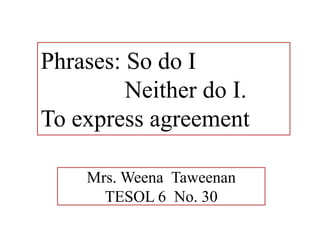The document provides instruction on how to use the phrases "So do I" and "Neither do I" to express agreement or disagreement with statements. It explains that "So do I" is used to agree with affirmative statements, using the same auxiliary verb. "Neither do I" is used to disagree with negative statements, also using the same auxiliary verb. If there is no auxiliary verb, "do" is used, and if the verb is "have", then "have" should be used in the response. Examples are given to illustrate the proper usage. The document concludes with a posttest applying the lessons.










